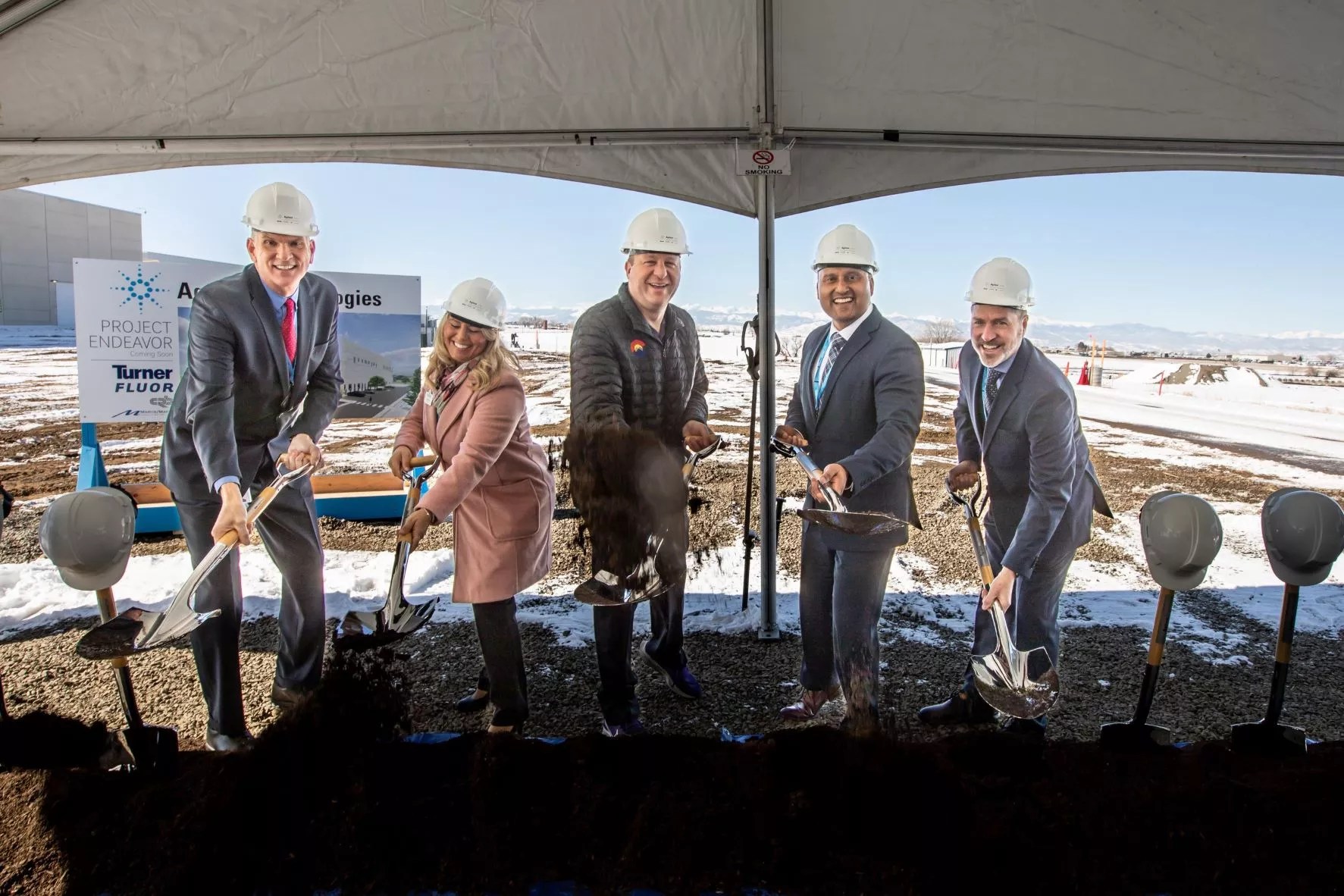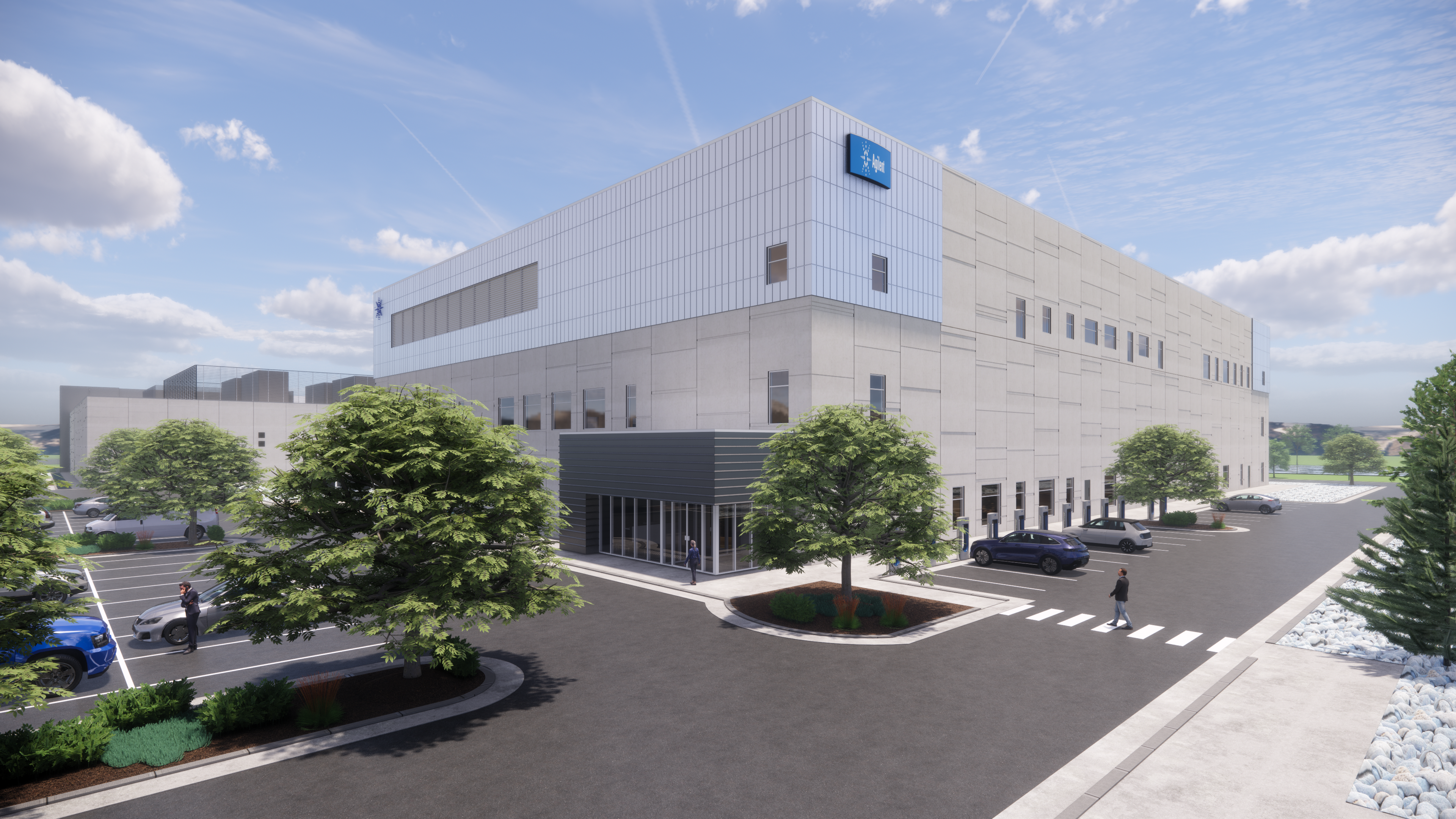
Courtesy Agilent Technologies

Audio By Carbonatix
While state, regional and local entities offer incentives to help companies decide whether to expand in Colorado, many companies say the best incentive is that the state itself rocks.
“Don’t get me wrong,” says Brian Carothers, vice president and general manager of Agilent Technologies, which is expanding into Frederick. “The incentives from Colorado were always well received and helpful, but really, it’s the Colorado culture. It’s the people. It’s the science.”
Agilent produces active pharmaceutical ingredients (think the acetaminophen in Tylenol), then sells them to other companies. It focuses on oligonucleotides, which are short DNA or RNA molecules that help target diseases. The company is headquartered in California, but it has had a location in Boulder since the 2000s. When Agilent wanted to expand, it decided to stay close by – in Frederick, about 25 miles east of Boulder along Interstate 25.
“We have strong roots in the area,” Carothers says.”There’s a strong history of knowledge coming out of the University of Colorado, and so there’s a lot of startups and know-how and scientific experience within this space.”
The company built a site in Frederick in 2016 and is now expanding with a new manufacturing facility that will add an estimated 160 jobs to the 700 Agilent already created in the state. Carothers says the company’s experiences while working with the Town of Frederick and Weld County previously had made it want to expand there if possible.
“I’ve been through this many times,” Carothers says. “You hear a lot of promises from state and local governmental officials, but I can tell you that they fulfilled them.”
So Agilent reached out to the Colorado Office of Economic Development and International Trade, the town itself and Upstate Colorado, a regional economic development nonprofit, about what programs could be leveraged to make the expansion happen in Frederick.
On January 9, Governor Jared Polis, along with the Global Business Development Division of OEDIT, announced that Agilent would invest $725 million in Frederick and that the Colorado Economic Development Commission had approved up to $1,787,500 in a Strategic Fund incentive that will give Agilent $6,500 per new job. Frederick and Weld County kicked in $9,387,123 over a ten-year period.
A Strategic Fund incentive is one of two major vehicles for tax incentives, along with a Job Growth Incentive Tax Credit.
Both programs are performance-based, so if companies don’t create the jobs they said they would, or don’t meet any other requirement, the state won’t pay out the allocated funds.
“We have fairly generous carry-forward periods with our tax credits, so that they would have opportunities to take that up again in the future if they didn’t meet it in the year where they expected to hire those jobs,” says Mike Landes, senior manager of business development for OEDIT. “This is a very forgiving program.”
The Job Growth incentive applies to companies that expect to have a tax liability in the state and offers 50 percent of the Federal Insurance Contributions Act. The Strategic Fund incentive relies on matching from local communities, making it a good fit for Agilent.
“To a certain degree, the conversation on the part of the state was very simple,” Landes says, noting that there were many conversations on the local level to make sure the matching incentives worked for everyone. “[Agilent has] been a good partner in all of this, and I really just want to emphasize on our side, hey, it’s nice to have a partner that really recognizes that the state wants to be in a long-term relationship with them and help them grow.”
The incentives go both ways. There are certain elements the state and region look for when it comes to businesses seeking funding.
First of all, companies must be seriously looking at expansion elsewhere. In Agilent’s case, it considered Raleigh, North Carolina.
“The state does not feel comfortable providing an incentive to companies that are not honestly looking at other locations, as well,” Landes says. The state asks for a cost-comparison analysis of possible locations from companies seeking incentives to ensure that the companies have actually inspected other areas.
Companies can either come to the state, as Agilent did, or the state can reach out to them. According to Landes, the state often checks in with major Colorado employers to be sure they’re aware of the possibilities for local expansion and to maintain those relationships.
There are fifteen industries the state considers strategically important, including many high-tech industries like aerospace, as well as others such as food and agriculture and outdoor recreation. Agilent fits within the bioscience industry, which is one of the fifteen.
According to the state, the bioscience and life sciences sector generates $12.3 billion annually and employs more than 32,000 workers in Colorado.
“If there’s anything that is a driving ethos for us, it is to let people know just how much this is a state where the local and state actors are in cooperation,” Landes says. “This is a state that pays attention to the whole state and not exclusively urban and Front Range areas, but also beyond that, that we take a real great sense of pride when we’re able to bring these kinds of projects to communities where we know they will make an enormous impact.”

The new Agilent facility in Frederick is expected to look something like this rendering.
Courtesy Agilent Technologies
In the case of Agilent, it will be located in Weld County, which is where Upstate comes in. The organization works primarily in Weld County, with some work in Larimer County, to help companies looking to locate in northern Colorado, with real estate searches, incentive negotiations, contracts with local communities and even local permitting processes. The goal is to make it easy for companies to know what they’re getting into and catalyze investment through primary employers – that is, those who make a product, then export it outside the community it’s located in.
“If a Walmart were to come into your community, that’s great. They’re creating 200 jobs. They’re creating payroll, it’s not a bad thing, but you’re also taking your paycheck and spending it there,” says Rich Werner, Upstate’s president and CEO.
Some of the money that’s spent at Walmart goes elsewhere, though, because the company is headquartered in Bentonville, Arkansas. Bioscience pharmaceuticals like Agilent are a good fit for Colorado because all of its money stays in-state.
Carothers says Agilent’s services cover a worldwide market, however.
“We’re attracting talent mostly within Colorado, but our reach is a lot farther than just Colorado,” he says.
Upstate networks to attract companies, but Werner says it mainly helps those inquiring about expansion to find all the information they need to work with the government entities involved, which helps the process go smoothly.
Landes jokes that he had Upstate on speed dial during the process of negotiating with Agilent.
“They know the state programs back to front,” he says. “I felt that it was almost a courtesy that they were talking to me about it. They are the exact right sort of hub for the wheel that is everything that surrounds the expansion of a project in a local area.”
Werner agrees that in his years on the case, monetary incentives aren’t the main reason businesses choose Colorado, though they don’t hurt. Rather, workforce tends to be the primary consideration, along with the availability of physical sites for expansion.
“If we do not have the available workforce, or the appropriately skilled workforce, they’re not coming,” Werner says.
In northern Colorado, Werner notes, the talent pool is strong because of the ability to commute from various locations in the state. Frederick, for example, is within a half-hour radius of Adams County, Weld County and parts of Larimer County. It’s also close enough to Boulder County to pull from the University of Colorado’s engineering school, which is important for Agilent.
Once a company knows it has a workforce and location, considerations about the cost of doing business come into play, Werner continues. That includes items like tax structure, infrastructure and utilities. Landes says that the state works closely with local partners to be sure everyone is on the same page and collaborates to showcase the availability of those assets in Colorado.
“We are on the scale of the lighter side of incentives in terms of dollar value, but our state tax structure, as well as the huge variety of other reasons to come to Colorado…our incredibly active and well-educated labor force, the concentration of high-tech industries and advanced industries, our location within the nation as a hub for transport, and our ability to communicate with East Asia and Europe and West Africa easily is something that makes Colorado real strategic priority,” Landes explains.
Carothers says the Town of Frederick has been helpful in integrating Agilent with the community and making it a great place to do business.
“All of that could not have happened without engagement from the town, and from the county, and from the state,” Carothers says. “They’ve been very responsive and attentive to our needs and really working with us trying to find ways to be a partnership and be a part of the community, not just a manufacturing company within their space.”
Besides, who wouldn’t want to come to Colorado?